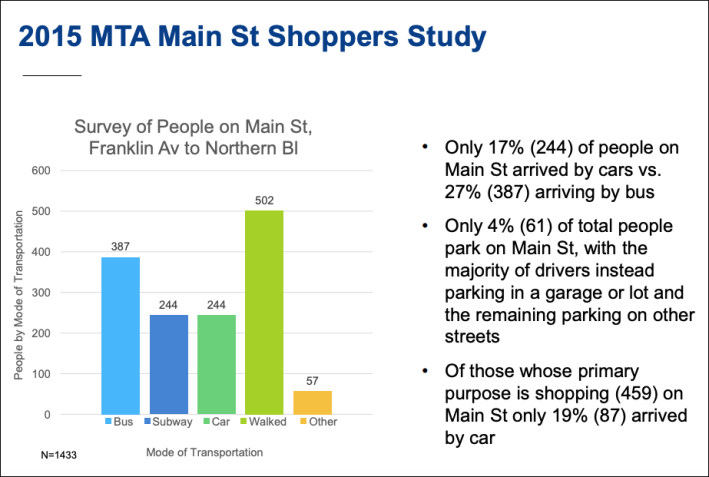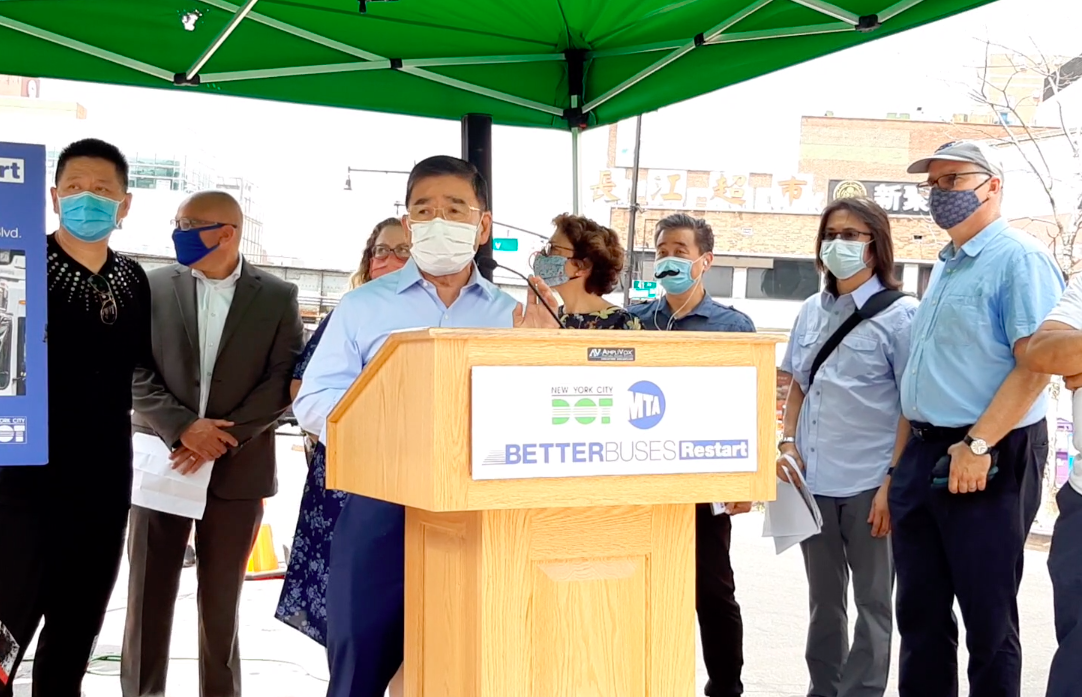Queens Council Member Peter Koo appropriated the Black Lives Matter movement on Thursday to push back against a planned busway on car-choked Main Street in Downtown Flushing, chanting "Business Lives Matter" in support of Flushing shop owners he claims will be hurt by the plan for the car-free roadway.
"BLM — that means what? Business Lives Matter!" Koo chanted during a Department of Transportation press conference on the busway. "BLM! Business Lives Matter!"
As Koo spoke, other busway opponents clapped — though it is unclear if the opponents were cheering for Koo's anti-transit stance or his tone-deaf reference to Black Lives Matter, a global movement that seeks, in part, to eliminate police brutality and has gained renewed strength after the police killings of George Floyd and Breonna Taylor.
Not only were Koo's comments insensitive, but they are factually inaccurate, according to local leaders and Department of Transportation data.
"Honestly I was shocked — the busway is much-needed in Flushing," said John Choe, executive director of the Greater Flushing Chamber of Commerce, who was on hand. "We need leadership that focuses on addressing transportation access. At this time, essential workers depend on quick and efficient and safe public transit to get to work and provide all the essential services that we critically need right now, and our business community needs more customers and foot traffic that better buses would bring to our district."
That's not how busways work, @CMPeterKoo. We have just the worst politicians. https://t.co/1IeMZzjfmG
— Second Ave. Sagas (@2AvSagas) July 30, 2020
In June, Mayor de Blasio announced he would create five new car-free busways in the city, including on a .3-mile stretch of congested Main Street between Northern Boulevard and Sanford Avenue.
But Koo, who has never been a friend to street-safety projects, is now actively advocating against it by claiming during the DOT event that businesses will suffer if people can’t get in their private cars and drive right up to storefronts to shop.
But that's just false. According to a 2015 DOT study of shoppers on Main Street, only 17 percent of people arrived by cars, while 27 percent arrived by bus. And even fewer people, just 4 percent, actually parked on the usually congested corridor in front of a storefront, according to a DOT presentation on the busway from last month.

A busway will not only help businesses by bringing more shoppers to their stores, but will also help straphangers plagued by slow public transportation. In May 2019, the Q44 SBS that heads north on Main Street inched along at no more than just 3.6 miles per hour on weekdays. And that's when it was at its fastest. The bus slowed to 2.1 miles-per-hour on Saturdays between 1 and 6 p.m. — a busy day for running errands.
Craig Cipriano from DOT: buses in Main Street move 2-3 mph, we need to improve bus service for the community pic.twitter.com/QNY43d40Bs
— Q44 Stan Account (@KGHboi) July 30, 2020
Koo has come under fire before for caring more about the needs of drivers than public transportation users and pedestrians, despite his district being one of the most dangerous places to walk in Queens. Last summer, Koo sat silently next to a Queens community board member who said that pedestrians “deserve” to get struck if they cross the street while looking at their phones.
And in 2017, during a Flushing Department of Transportation forum, he said, “Biking is good for your health, it saves gas, it’s good for the environment, but it’s not appropriate in downtown Flushing.”
Koo has also repeatedly declined requests to speak with Streetsblog about street-safety issues.
A spokesman for Koo said the council member "has spoken out about the importance of recognizing that Black Lives Matter," and "apologizes for mixing these messages." But the spokesman said Koo did not back down from opposing the busway.
"He is an extremely passionate advocate for small businesses in Flushing. It was not his intent to minimize BLM, but to express his discontent that this administration has repeatedly left the Flushing Asian business community out of the conversation," said the spokesman, Scott Sieber.






